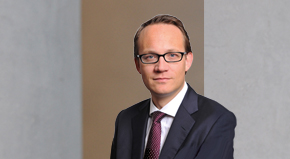German RWE, EnBW See Margins Fall
Leading German power giant RWE boosted 1Q net profits by 10% but its smaller rival EnBW fared less well.
RWE’s 1Q net income was €946bn ($1.04bn), up 10% year on year, with its CFO Markus Krebber declaring it “got off to a good start” with energy trading making a strong contribution to earnings. However its operating result (adjusted Ebitda) was 6.5% lower at €2.13bn, as both its ‘Lignite & Nuclear’ and ‘European Power’ key divisions were impacted by lower power wholesale prices, with the latter also by a decline in generation margins for gas and hard coal.
“In 2016, we realised an average price of around €35/MWh, as opposed to just €31/MWh so far this year,” said Krebber (pictured below).
Also despite this year’s colder winter, RWE sold 1.6% less gas year at 8.9bn m³ in 1Q 2017.
RWE spun off its Innogy grids business in October last year but retains a 76.8% stake in it. Group-wide, RWE made a net loss in 2016 of €5.7bn.

Markus Krebber, RWE chief financial officer (Photo credit: RWE)
Germany’s third largest generator EnBW had a bumpier ride in 1Q2017 owing to an unscheduled nuclear outage at its Philippsburg 2 unit, with adjusted Ebitda down 17% to €513.4mn. “We expect compensatory effects during the remainder of the year including from the full consolidation of [German gas group] VNG,” said CFO Thomas Kusterer.
EnBW’s generation and trading segment saw its adjusted Ebitda fall by 75% year on year to €42.5mn, impacted by the nuclear outage, but also lower wholesale market prices, and it continues to expect a full year result in this sector down by 10%-20% on 2016. Conversely its grids business posted an 8% gain in Ebitda to €308.6mn thanks mainly higher earnings from gas distribution grids due to the cold 2017 winter.
EnBW is mainly active in Germany, whereas RWE power plants are more broadly based in Germany but also the UK, Netherlands, Belgium and Turkey.
The southwest German state of Baden-Wurttemberg and local authorities jointly own and control EnBW; in contrast to RWE and its chief German rival Uniper, both of which sold off their upstream assets, EnBW subsidiary VNG still retains stakes in fields offshore Norway and Denmark.
Update: Austria's regulator E-Control and its German counterpart, the Bundesnetzagentur, said May 15 they have agreed on the introduction of a congestion management scheme for electricity trading at the German-Austrian border starting from 1 October 2018.
Mark Smedley



